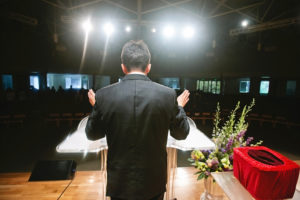When Will Religious People Say “Time’s Up”?

In recent months we’ve all become familiar with the #MeToo movement against sexual harassment and assault. Much of the activity has focused on allegations against men in entertainment, media, and politics. Charges against people like Harvey Weinstein, Kevin Spacey, Matt Lauer, Charlie Rose, former Senator Al Franken, and former Representative John Conyers have resulted in the swift removal of the perpetrators from their positions of authority.
Allegations have also been made against men in positions of authority in the religious realm. And yet, those allegations haven’t ignited a push to take righteous action against the perpetrators or to support the accusers. Many religious people—men and women—have stood up and said “me too,” but when will religious people finally say “time’s up”?
The most prominent figure accused of sexual assault and predation who’s also closely associated with conservative Christianity is Roy Moore, the defeated Republican candidate for Senate in Alabama. Although multiple women accused Moore of preying on them when they were in their teens and he was in this 30s, he was able to stay in his race for the United States Senate (enjoying support of the president and the GOP in the end). A key factor in his ability to continue was support from his base of evangelical Christians. In fact, in the final count Moore garnered 80 percent of the vote of “white born-again Christians,” despite the accusations of child molestation. Luckily, he only received 22 percent of the “everyone else” vote which comprised more people, so he ultimately lost and we won’t have to deal with him in the Senate.
An allegation of sexual abuse of a teenager was also recently brought against Andy Savage, the pastor of a megachurch in Tennessee. The victim, seventeen years old at the time, recently published a graphic account of how Savage assaulted her in his car when he was driving her home from a church event. Far from a case of “she said, he said,” Savage admitted to the act, although he described it a bit differently as a “sexual incident” and seems to think he should get a pass because he “took every step to respond in a biblical way” and begged for his god’s forgiveness. Savage’s current congregation apparently agrees because they gave him a standing ovation when he confessed to them about the “sexual incident.” Worse yet, the woman reported the abuse to the church at the time it occurred, but they apparently took little or no action.
The Catholic Church has a long and well-documented history of covering up abuse of children by priests, and yet, the church has punished only a few of the men in authority who allowed the abuse to happen. When Cardinal Bernard Law died in December, he was given a full cardinal’s funeral at the Basilica of St. Peter in Rome with a “final commendation” from Pope Francis. This, despite the fact that Law played a significant role in covering up child abuse by priests in the Boston archdiocese. In fact, Law escaped criminal sanctions for his part in hiding those abuses and, although he was forced to resign his position in Boston, he simply moved to Rome where he assumed another official post.
Just yesterday, on a visit to Chile the pope did ask forgiveness for the “irreparable damage” done to children in that country by sexually abusive priests. But it’s hard to know what his apology is worth, since few changes have been instituted. The Vatican relegated the country’s most notorious pedophile priest to a “life of penance and prayer” but the emeritus archbishop of Santiago, who admitted to knowing about the abuse and doing nothing, has faced no repercussions.
In a different kind of abuse, the Boston Globe recently ran a series about Catholic priests who have fathered children. According to the series, the mothers (who many would argue are victims of sexual abuse by definition since priests are in a position of authority over the faithful which makes consent dubious at best) and their children are frequently abandoned and shamed while the priest/father continues to hold a position of prominence in their communities. Adult children in these situations tell stories of the scars left by secrecy, neglect, and shame.
Despite this history, Bill Donhue, president of the Catholic League, insists that the Catholic Church is a model of how to handle abuse allegations, saying, “there is no institution in the nation today, religious or secular, that has a better record in dealing with sexual misconduct than the Catholic Church.”
Like the women who refused to stay silent about Roy Moore and Andy Savage, perhaps we will begin to hear from more victims of sexual harassment and abuse in the religious realm. Websites like FaithLeaks.org provide a way for people to submit documents of abuses of all kinds. Still, once documents have been submitted—if documents of abuse even exist in a particular case—someone within the faith must hold the perpetrators responsible. Right now, that just doesn’t seem to be happening enough.
